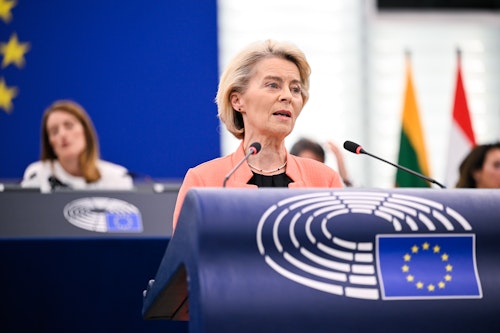Ein Misstrauensantrag gegen Kommissionspräsidentin Ursula von der Leyen und ihre Kommission ist am Donnerstag im EU-Parlament in Straßburg gescheitert.
Ursula von der Leyen und die Europäische Kommission haben ein Misstrauensvotum im Europäischen Parlament überstanden. 175 Abgeordnete stimmten für den Misstrauensantrag, 360 dagegen und 18 enthielten sich.
 WERBUNG
WERBUNG
 WERBUNG
WERBUNG
Die Ja-Stimmen lagen deutlich unter der für einen Erfolg erforderlichen Zweidrittelmehrheit aller abgegebenen Stimmen.
Von der Leyen, die bei der Abstimmung nicht im Plenarsaal anwesend war, ist vorerst in Sicherheit. Aber die Abstimmung hat sie zweifellos geschwächt und Zweifel an der Unterstützung ihrer Agenda im Parlament aufkommen lassen.
Die Sozialisten und Demokraten haben als Gegenleistung für ihre Unterstützung eine Zusage für den nächsten langfristigen Haushalt erhalten, die nächste Woche auf die Probe gestellt wird, wenn der Vorschlag der Kommission veröffentlicht wird.
Die rechtsgerichteten Fraktionen "Patrioten für Europa" und "Europa der souveränen Nationen" sowie ein Großteil der Europäischen Konservativen und Reformisten und einige Delegationen der Linken stimmten für den Antrag.
Verfolgen Sie die Reaktionen mit unseren Reportern vor Ort in Straßburg und in ganz Europa.

 ${title}
${title}
Live beendet
Motion ends and so does our blog
That's all for us today.
Thank you for reading our coverage of the motion of censure against Ursula von der Leyen and her European Commission.
Von der Leyen's next political test: the EU budget
Fresh from surviving her first-ever motion of censure, Ursula von der Leyen is getting ready for her next political test.
Next week, the president of the European Commission will present her highly anticipated and much speculated proposal for the next multi-annual budget, set to run from 2028 to 2034.
Budget negotiations are always tough and bitter (remember the marathon talks in the summer of 2020), and this time around won't be any easier. Von der Leyen has the hard task of balancing traditional envelopes of money, such as agriculture and cohesion, which Southern and Eastern European countries jealously guard, with funds for strategic and modern-day priorities, which Western and Northern European countries want to boost. At the same time, she needs to ensure support for Ukraine remains steady and the debt from the COVID-19 recovery fund is gradually repaid.
Her proposal will be closely examined by the European Parliament, where each party will fight tooth and nail to secure funding for their priorities. The Socialists and Democrats (S&D) seized the opportunity of the motion of censure to demand the continuation of the European Social Fund in the next budget. This offers a preview of the intense back-and-forth that will begin once the proposal is formally on the table.
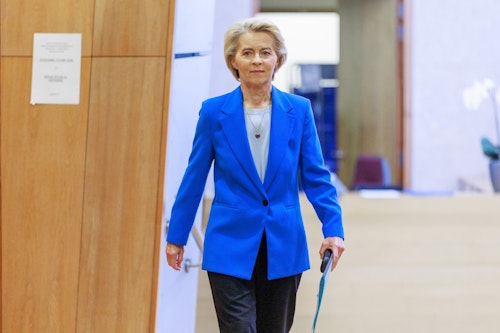
Greens back von der Leyen. But at what cost?
The Greens faced a difficult decision ahead of today’s vote: whether to continue formally backing Ursula von der Leyen, even as her environmental agenda has largely been buried under the so-called ‘omnibus’ packages.
The dismantling of the Green Deal by von der Leyen’s Commission happened despite the promises she made to the Greens just last year to secure their support for her reconfirmation.
In the end, a clear majority — 33 out of 53 Green MEPs — chose to stand by her again. Importantly, none of them voted in favour of the motion of censure, which was widely seen as led by the far right. The Italian Greens abstained, opting not to vote at all, at least ensuring they didn’t side with von der Leyen’s opponents.
Still, the Greens are in a deeply paradoxical position within the European Parliament.
During von der Leyen’s first mandate, the Greens remained in opposition, even as she introduced the European Green Deal.
Yet they became the last defenders of key files like the Nature Restoration Law, even when von der Leyen’s own party, the EPP, had already abandoned them.
Now, in her second term, with much of the Green Deal dismantled, the Greens are still acting as if they’re part of the governing majority.
But in practice, they’ve been sidelined. Their legislative priorities have been gutted, and they find themselves repeatedly voting against attempts to roll back environmental legislation.
After a year, the Greens’ continued support for von der Leyen seems to have yielded little, aside from a well-paid advisory role for former Green leader Philippe Lamberts in her cabinet.
With the EPP clearly drifting further to the right, the Greens face a looming reckoning: Should they keep backing a Commission that no longer champions their agenda?
Socialists helped Von der Leyen survives, but demand real shift from EPP
S&D leader Iratxe García Pérez made clear why her group rejected today’s no-confidence motion: “European Socialists stay true to our principles. We voted NO to the far right and its destructive initiatives.”
As with Renew, however, the support came with conditions.
She called on von der Leyen’s party, the centre-right EPP, to commit to “a social, fair and green Europe”.
On Wednesday the socialists said that they would back von der Leyen after obtaining a promise that the social fund would be secured within the Commission's proposal for a long term EU budget. That proposal is set to be published next week.
🇪🇺 Los socialistas europeos somos fieles a nuestros principios.
— Iratxe García Pérez /❤️ (@IratxeGarper) July 10, 2025
Votamos NO a la ultraderecha y sus iniciativas destructivas.
Exigimos el compromiso real del EPP con una Europa social, justa y verde. Nosotros vamos a seguir luchando para toda la ciudadanía. https://t.co/Qv3r759ySR
Meloni’s MEPs sit out: Loyalty to Ursula could cause tensions on the right
One of the key takeaways from today’s vote is the clear split within the conservative ECR group (as Euronews reported earlier).
A total of 41 ECR MEPs voted in favour of the motion of censure — in other words, against Ursula von der Leyen and her Commission. Notably, the motion itself was spearheaded by an ECR member: Romanian MEP Gheorghe Piperea.
A small number of conservatives broke ranks:
- 3 MEPs — Dutch MEP Bert-Jan Ruissen and Belgian N-VA members Kris Van Dijck and Johan Van Overtveldt — voted against the motion, siding with parties that support the Commission.
- Two others, Danish MEP Kristoffer Storm and Bulgarian MEP Ivaylo Valchev, chose to abstain.
But the most striking absence is the 24 MEPs from Giorgia Meloni’s Fratelli d’Italia. The largest delegation within ECR did not take part in the vote at all, signalling open dissent within their own group.
Meloni appears to remain loyal to von der Leyen, especially given that her MEPs supported the Commission a year ago.
But now they’ll be juggling a political balancing act: maintaining support for von der Leyen, while managing tensions within a group that has decisively positioned itself outside the pro-EU majority.
A polite co-existence, for now. But the fault lines are widening.
The big question: Will von der Leyen change?
The motion of censure was always a long shot, but the big question remains: Will von der Leyen change? Will she make amends with the Parliament? Or will she continue her manner of governing?
In her first reaction, von der Leyen seemed to extend a hand of cooperation. "We need everyone to deliver on our common challenges. Together," she wrote on social media.
Socialists, Liberals and Greens, who have grown exasperated with what they say is von der Leyen's gradual shift to the right, will now be on high alert, keeping a close eye on every move she makes, ready to call her out and demand a retraction. The centrist coalition is visibly frayed and therefore more vulnerable to internecine disputes.
While von der Leyen isn't known for being apologetic and remorseful, this marks the first time since her arrival in Brussels in 2019 that she has faced a vote of this kind. The prospect of a second motion of censure might be enough for her to make a change, even if moderate, to get back in the Parliament's good graces.
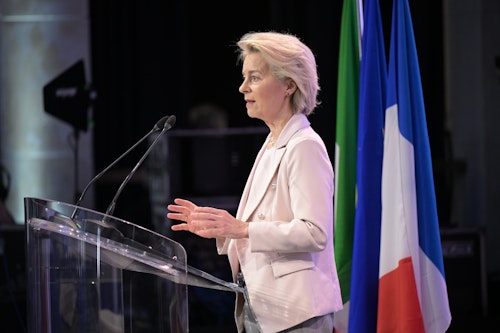
Von der Leyen reacts: 'Thank you'
We've just got the first reaction from Ursula von der Leyen after surviving the motion of censure.
In a brief message on social media, von der Leyen thanks lawmakers who backed her presidency and calls for unity to face the plethora of challenges besetting the European Union.
"In a moment of global volatility and unpredictability, the EU needs strength, vision, and the capacity to act. We need everyone to deliver on our common challenges. Together," she said on social media.
"As external forces seek to destabilize and divide us, it is our duty to respond in line with our values. Thank you, and long live Europe."
In a moment of global volatility and unpredictability, the EU needs strength, vision, and the capacity to act.
— Ursula von der Leyen (@vonderleyen) July 10, 2025
We need everyone to deliver on our common challenges.
Together.
As external forces seek to destabilize and divide us, it is our duty to respond in line with our…
First (evident) outcome: Von der Leyen’s support narrows
As we await the full roll-call breakdown to assess each party’s stance, one result is already clear: Ursula von der Leyen’s majority is shrinking.
Exactly one year ago, her Commission secured 401 votes in a confirmation vote. Today, only 360 MEPs voted against the motion of censure, a statistic that can be seen as those lawmakers who are still supporting her after one year.
To put that into perspective: 360 votes wouldn’t have been enough to confirm her last year, as she would’ve needed at least 361.
What makes this even more striking is the context. Last year’s vote was secret, allowing room for political backstabbing and hidden dissent.
Today’s vote, however, was by roll-call, meaning every MEP’s vote will be made public in the coming hours. In theory, that should’ve encouraged greater party discipline and stronger backing.
Instead, it’s revealed the opposite: support for von der Leyen’s Commission is slipping, and that’s happening even in full display.
Last year’s vote was also based on promises, specifically, the political guidelines von der Leyen laid out for the next five years.
This time, however, the vote reflects her first year in action during a second term, and it reveals a growing sense of dissatisfaction in the European Parliament with what has been delivered so far.
A quick breakdown of the results
A quick look at the results shows that the vast majority of centrist lawmakers who supported von der Leyen's re-election last year voted against the motion of censure.
As you can see in the image below, the sections occupied by the centre-right European People's Party (EPP), the liberals of Renew Europe, the Socialists and Democrats (S&D) and the Greens are mostly in red, indicating a vote against the motion. We can also see a few grey dots here and there, which indicate abstention. An abstention is a way to express discontent towards von der Leyen without explicitly endorsing the motion.
Meanwhile, the votes in favour come largely from the Patriots for Europe (PfE) and the European of Sovereign Nations (ENS), the two far-right groups in the Parliament. We can also see some votes in favour from the right-wing European Conservatives and Reformists (ECR) group, which was internally split, and from non-attached MEPs, who sit at the very top of the hemicycle. Additionally, we can see a few votes in favour coming from the Left group, which has been highly critical of von der Leyen since the beginning of her presidency.
It's also important, and very telling, to note that over 160 MEPs just didn't show up to the vote.
A complete breakdown of the votes is expected later today.
Renew leader warns von der Leyen: our support isn’t guaranteed
Valérie Hayer, president of the centrist Renew Europe group, confirmed her group voted against the no-confidence motion — but issued a clear warning to Commission President Ursula von der Leyen.
“Our support is not guaranteed,” she wrote on X, calling on von der Leyen to “take back control of her political family” and end “alliances with the far right.”
She also demanded respect for the pro-European majority that elected her and a commitment to implementing their shared agenda.
La Motion de censure contre la Commission européenne a été largement rejetée. @RenewEurope a voté contre cette Motion. Mais notre soutien à @vonderleyen n’est pas acquis.
— Valérie Hayer (@ValerieHayer) July 10, 2025
Nous demandons :
- la reprise en main de sa famille politique pour cesser ses alliances avec l’extrême… pic.twitter.com/4dQltjzDG3
The no-confidence motion: a challenge over COVID texts, funds and green lobbying
Romanian MEP Gheorghe Piperea (AUR), from the European Conservatives and Reformists (ECR), is behind the no-confidence motion against von der Leyen, accusing her of blocking justice over Pfizer vaccine texts.
“The EU Court of Justice in Luxemburg stated that the European Commission should disclose those SMS [...] The European Commission rejected the request. It's about separation of power in a democracy: if you cannot accept a decision of justice, this means breaking the rule of law,” Piperea said.
He also targets alleged post-COVID funds misspending and claims the Commission funded NGOs to push its green agenda, both denied by von der Leyen’s team.
Piperea knows the motion will likely fail but hopes it will “open a Pandora’s box” for future challenges.
More on Vincenzo Genovese's article.
Von der Leyen survives no-confidence vote - for now
With 360 votes against; 175 in favour and 18 abstentions, the motion to censure Commission President Ursula von der Leyen has been rejected. The vote of 2/3 of the 720 members of the European Parliament in favour was necessary for its adoption.
But the fierce debate and today’s vote have opened a Pandora’s box. Support for the EU’s top executive is shakier than ever, and this may just be the beginning.
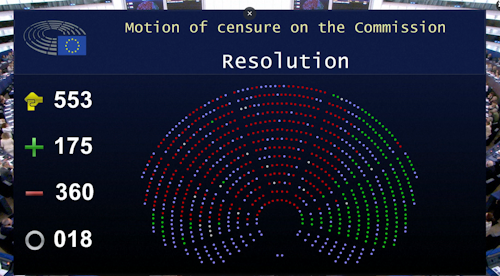
Vote on motion of censure begins
Roberta Metsola, the president of the European Parliament, has opened the voting on the motion of censure.
Von der Leyen announces new fund for the reconstruction of Ukraine
As we wait for the vote on the motion of censure, Ursula von der Leyen has announced the creation of a new fund for the reconstruction of Ukraine, which she described as "the largest equity fund globally" to support the war-battered country.
The fund will be set up in cooperation with Germany, France, Italy, Poland and the European Investment Bank.
"It will kickstart investment in energy, transport, critical raw materials and dual-use industries. We are literally taking a stake in Ukraine’s future by leveraging public money to bring large-scale private sector investments and to help rebuild the country," she just said in Rome.
"The time to invest is now."
Motion of censure puts Ursula von der Leyen in rare position: defiance
Ursula von der Leyen isn't known in Brussels for admitting mistakes.
The president of the European Commission carefully avoids being dragged into the controversies and dramas of day-to-day politics. She prefers to stay above the fray and focus her public interventions on the bigger picture: the great challenges facing Europe today.
But the motion of censure has pierced through that pristine image, forcing von der Leyen into an awkward spotlight. On Monday, she struck a defiant tone to defend her presidency against a motion that she described as essentially baseless and conspiratorial.
"We should be under no illusion about the threats our democracy faces. We have entered into an age of struggle between democracy and illiberalism. We see the alarming threat from extremist parties who want to polarise our societies with disinformation," von der Leyen said.
"There is no proof that they have any answers, but there is ample proof that many are supported by our enemies and by their puppet masters in Russia or elsewhere," she went on, pointing to the benches where the far right sits. "And you only have to look at some of the signatories of this motion to understand what I mean."
Von der Leyen slams ‘Russian puppets’ as MEPs debate motion of censure
“We can never let extremists rewrite history,” Ursula von der Leyen said as she defended her presidency against a motion of censure. #EuropeNews
Conservative family feud goes public over Commission censure vote
The no-confidence vote hasn’t just shaken the Commission, it’s tearing the Conservatives apart.
Within the European Conservatives and Reformists (ECR), deep divisions have surfaced: Polish (PiS) and Romanian (AUR) MEPs helped launch the motion, while Italy’s Brothers of Italy are staunchly defending von der Leyen.
ECR co-chair Nicola Procaccini openly attacked his own allies in a fiery speech, calling the motion a “mistake” and a “gift to our opponents”, a move that infuriated conservative colleagues.
Up to 50 of the group’s 79 MEPs may vote for the motion, putting Procaccini’s leadership on shaky ground and revealing just how fragile the Conservative alliance has become.
Click here for the full story by Vincenzo Genovese and Dominika Cosic.
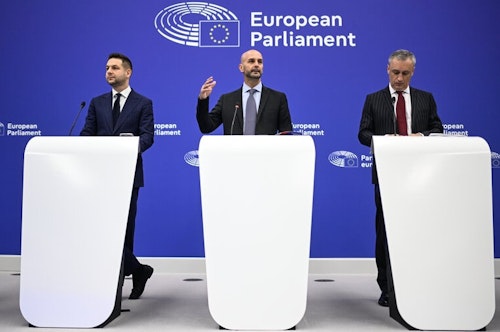 JAKI Patryk, PiS' Vice President, and PROCACCINI Nicola, Brothers of Italy, at the ECR Press briefing (17/06/2025). Copyright: © European Union 2025 - Source : EP
JAKI Patryk, PiS' Vice President, and PROCACCINI Nicola, Brothers of Italy, at the ECR Press briefing (17/06/2025). Copyright: © European Union 2025 - Source : EP
Socialists back von der Leyen, but there’s a price
The Socialists & Democrats (S&D) are voting against today’s no-confidence motion, but only after von der Leyen promised to protect the European Social Fund in the next EU budget.
This “red line” guarantee helped secure the EP second biggest group’s backing, though some lawmakers may still abstain.
More on Vincenzo Genovese's article for Euronews.
Socialists back von der Leyen in return for pledge on social budget
Socialists are backing the Commission President but only in exchange for budget guarantees, including the European Social Fund, and political divisions and ten…
Pressure builds, but at least no one’s getting thrown in the river
Ahead of the crucial midday vote, all 27 EU Commissioners (and their boss, Ursula von der Leyen) are holding their breath, awaiting ‘judgment’ from lawmakers.
Today’s parliamentary pressure is real. But let’s put things in perspective: Strasbourg has seen much harsher forms of “judgement”, just a few centuries ago.
A short walk from the European Parliament, you might stumble across the Pont du Corbeau — the Bridge of the Crow. Now a scenic shortcut between the cathedral and the buzzing nightlife around Place d’Austerlitz, it once had a much darker role.
Originally known during the city’s German era as Schindbrücke (Bridge of Tortures), this was a place of gruesome public justice.
In 411 AD, a law mandated that those condemned to death be sewn into linen sacks and thrown into the river. And yes, this practice continued until 1617.
By 1466, even petty criminals, like thieves or garden robbers, were locked in iron cages on the bridge, mocked by passers by, then tossed into the river.
To earn their freedom, they had to swim back to shore. No trial. No final vote from lawmakers. Just cold, wet punishment.
Pas très fun, l’Ancien Strasbourg.
So yes, democracy may be slow, messy, and full of suspense… But compared to a linen sack in the river? We’ve come a long way.

Von der Leyen: a president caught between two institutions
The motion of censure in the European Parliament reveals a characteristic of Ursula von der Leyen's governance that has become more pronounced with each passing year.
As president of the European Commission, the bloc's executive arm, von der Leyen is expected to work closely with the two co-legislators: the Council, where member states are represented, and the Parliament, where directly elected lawmakers take a seat. The draft proposals presented by the Commission require the blessing of both institutions to become law.
But as the bloc faced back-to-back crises that necessitated fast and decisive action, most notably Russia's invasion of Ukraine, von der Leyen turned heavily to the capitals, which hold exclusive competence over foreign policy. Seeking to bolster support for her ambitious agenda, von der Leyen sought to deepen her relations with leaders from all across the political divide, from Italy's Giorgia Meloni to Spain's Pedro Sánchez. The bet largely paid off: last year, the 27 leaders hand-picked her for a second mandate with little to no fuss.
In the Parliament, though, the bet somehow backfired. Lawmakers often complain about how little they see and hear from von der Leyen. When she shows up for debates in the hemicycle, she tends to exit after her intervention, leaving MEPs to address one of her deputies. Socialists, liberals and greens have the impression that von der Leyen takes their votes for granted and makes no effort to secure their buy-in. Her ties with Meloni have been roundly decried as evidence of a right-wing shift.
This partly explains why the motion of censure has opened the gates for scathing criticism coming from centrist parties, despite the motion in itself being filed by the radical right.
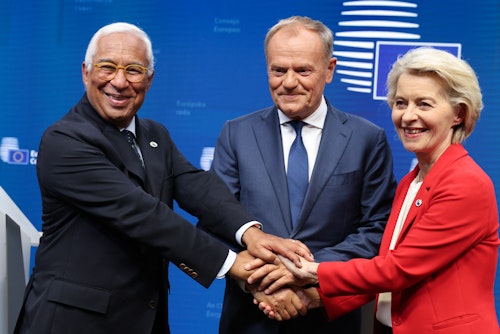
As MEPs vote on motion of censure, von der Leyen keeps business as usual
With the motion of censure unlikely to succeed, Ursula von der Leyen keeps business as usual.
The Commission president is in Rome attending the Ukraine Recovery Conference, where she is expected to announce additional money for the war-battered country. Earlier this morning, she gave a speech at a French-Italian economic forum and spoke about her big push to simplify regulation and the trade talks with the United States.
"We are working non-stop to find an initial agreement with the US – to keep tariffs as low as possible, and to provide the stability that businesses need," she said. "Because we believe tariffs are a lose-lose. A tax on industry. A tax on people. But we are also not naïve, we know the relationship with the US may not return to what it once was."
Who will vote what?
According to Euronews journalists Vincenzo Genovese and Maïa de La Baume, most political groups won't back the no-confidence motion against von der Leyen, but many took the opportunity of the debate on the motion to criticise her leadership.
Far-right groups Patriots for Europe and Europe of Sovereign Nations are united in wanting von der Leyen out.
The European Conservatives and Reformists (ECR) are split: Romania’s Alliance for the Union of Romanians (AUR) and Poland’s Law and Justice (PiS) support the motion, while Italy’s Brothers of Italy are against it.
The Left group won’t back the motion officially, but Italy’s Five Star Movement and Irish MEPs will vote in favour.
The European People’s Party (EPP), the political family of the Commission President, is fully behind von der Leyen.
S&D, Renew Europe and the Greens/EFA say they won’t support the motion, but all voiced strong criticism of her leadership and alliances with more conservative parties. The socialists position evolved during the week.
Check Vincenzo Genovese and Maïa de La Baume's article for more.
EU Parliament confidence vote: Where parties stand on von der Leyen
Most of the political groups are not set to endorse the motion of censure that would topple von der Leyen’s Commission. But she was not spared from criticism.…
Von der Leyen faces motion of censure
Good morning and welcome to our live blog dedicated to the motion of censure against Ursula von der Leyen, the president of the European Commission.
It is the first time that von der Leyen has faced a vote of this kind since her out-of-the-blue arrival in Brussels back in 2019. The motion may struggle to succeed, as it has only gathered public support from hard- and far-right parties.
However, the mere fact that it is happening reflects growing discontent in the European Parliament towards the woman who has effectively become the most powerful politician in Brussels. Von der Leyen's gradual shift to the right, particularly on the Green Deal and migration policy, has angered the socialists and liberals who supported her re-election last year. Both groups have distanced themselves from the motion of censure while seizing the opportunity to air their grievances and demand her return to the political centre.
The vote will take place shortly after midday. Stay tuned for the results.
